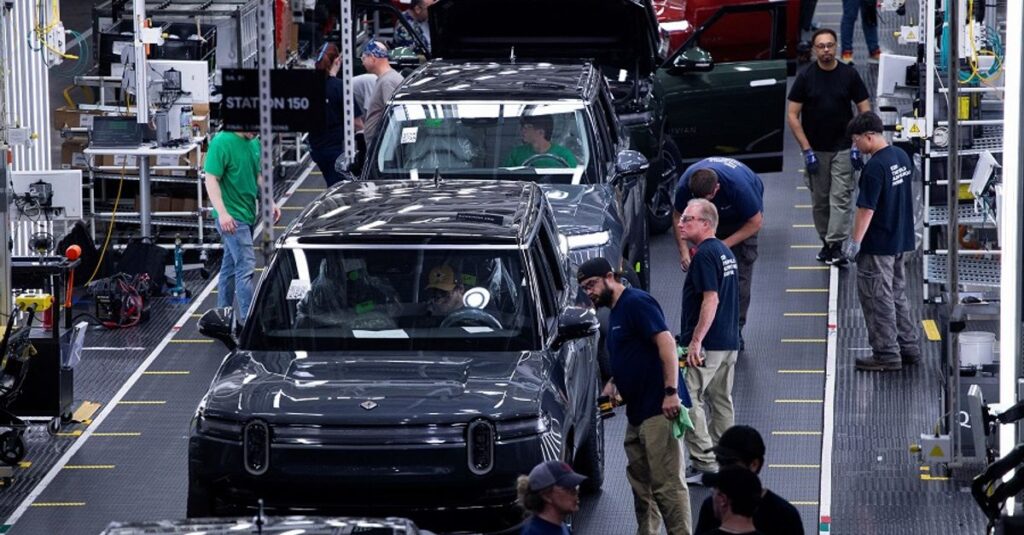The Trump-Vance Rhetoric: Revisiting an Old Mindset in a New Era
In a remarkable twist of fate, former U.S. President Donald Trump has resurfaced as a political heavyweight, shrugging off near-death experiences and reinvigorating his supporter base. Alongside him, J.D. Vance, a U.S. senator from Ohio and author of the critically acclaimed memoir, Hillbilly Elegy, forms a dynamic, albeit nostalgic, duo focused on catering to the discontented American working class, particularly those in the rust-belt states.
Assembling second-generation R1 vehicles at electric auto maker Rivian’s manufacturing facility in Normal, Illinois, the image captures the dichotomy of modern American industry—innovative yet entrenched in old-world grievances. The Trump-Vance rhetoric, blaming China for American economic woes, echoes sentiments from the 1970s, pointing to what some analysts regard as an outdated mindset that may ultimately do more harm than good.
Globalization and the American Dream
The promise of a revitalized American dream appeals to many, especially those in the heartland states disillusioned by globalization. The Trump-Vance pairing aims to address the inequities perceived by these communities, yet their solutions seem rooted in a bygone era. Vance, with his deep understanding of rust-belt struggles, has a perspective firmly anchored in the mid-20th century—the idealized life of a well-paid, stable job, homeownership, and traditional family values.
This perspective fails to acknowledge that the world has changed dramatically since then. U.S.-led globalization has indeed led to the outflow of capital, technology, and jobs, altering the American economic landscape. However, attributing domestic socioeconomic issues solely to foreign entities like China oversimplifies a complex web of global interdependencies.
Historical Echoes with Japan
This isn’t the first time the U.S. has scapegoated a foreign nation for its domestic job losses. During the late 20th century, Japan was frequently blamed for America’s economic challenges, particularly in the automotive sector. Japanese political and economic theorist Kenichi Ohmae criticized this simplistic blame game, pointing out that American consumers crave the best products at the lowest prices, often irrespective of the country of origin. This consumer behavior is paradoxical when juxtaposed with demands for high-paying domestic jobs and patriotic economic policies. Essentially, Americans want to "have their cake and eat it too."
The Changing Landscape of U.S.-China Relations
The U.S.-China trade war mirrors these historical tensions. While American politicians like Vance may rally against China for "stealing jobs," the reality is that manufacturing has shifted not back to the U.S., but to countries with even cheaper labor, such as Vietnam and Cambodia. This raises the question: will future leaders initiate similar trade wars against these nations?
Moreover, China’s presence in the American market has evolved. No longer confined to just manufacturing, Chinese businesses now shape American consumer behavior and culture through platforms like TikTok, and e-commerce giants such as Shein and Temu. This shift indicates China’s growing soft power, influencing the American lifestyle in ways that economic trade issues do not wholly capture.
Cultural and Economic Divergences
The narrative of the "rust-belt redneck" is more complex than a mere economic grievance. It also involves a cultural resistance to change and adaptation. While regions in China have successfully transformed abandoned industrial spaces into vibrant cultural and commercial hubs, American rust-belt communities often remain paralyzed, gripped by sentimentality for a lost era. The systemic issues within American capitalism, particularly its failure to uplift the white working class, contribute to this stagnation.
Conclusion: An Outdated Solution for a Modern Problem
If the Trump-Vance duo takes office, their policies could likely be grounded in outdated notions of economic nationalism and protectionism. In a world that has moved past the manufacturing paradigms of the 1970s, such approaches might not only fail but exacerbate the intellectual and economic divides within the U.S.
For a more robust solution to the grievances of the rust-belt states, America must adapt to the realities of a globalized economy, fostering innovation and education rather than retreating into nostalgic economic policies. Without such a shift, the elegy for Ohio and similar regions may continue to be sung, without providing a path forward for the disenfranchised American working class.
